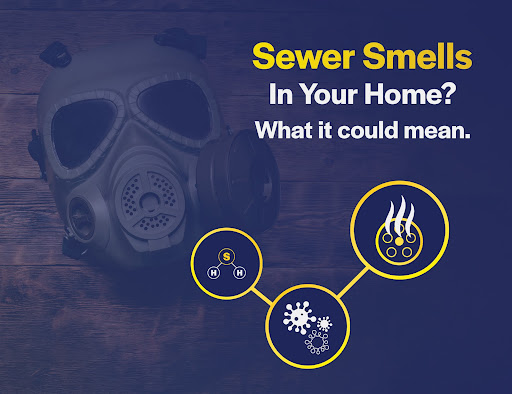
Sewer gas is a mixture of compounds released during the decomposition of organic and industrial waste. One of these chemical compounds is hydrogen sulfide, a gas that is toxic to the oxygen system of the human body. Though this is not a gas you can see, it’s one you’re sure not to miss as its characteristics include a potent and repulsive odor of rotten eggs. Prolonged exposure to this poisonous gas can result in dizziness, severe headache, apnea, convulsions, organ damage, failure and eventually death, as your body fails to deliver oxygen to your cells.
Fortunately the health risks associated with hydrogen sulfide concentration levels in household water are usually not as severe, but if you smell sewer gas in your home, this is an issue you do not want to ignore.
Potential Causes of Sewer Smells
While sewer smells can point to a serious, underlying plumbing issue, that doesn’t always have to be the case and the solution can be a simple one. Here are the potential causes of sewer smells intruding into your home and how to fix them.
Blocked vent pipe
A vent pipe can be accessed by roof and it’s responsible for allowing the gasses from your sewer line and drains to be released outside. Unfortunately sometimes these vents can get covered and blocked by bird nests or debri, trapping gas inside. A blocked vent pipe causes gas to enter your home, often causing gurgling sounds in your toilet.
Solution: Access your roof, locate your vent pipe and check for any obstruction. Climbing your roof should be done using extreme caution. You should not attempt this alone. If you are not able or comfortable performing this, call a plumber who will do this for you.
Dried out p-trap
A p-trap is the curved pipe you can spot under any sink. Water is collected in the curved part of this pipe, creating a barrier between your sink or shower and the remainder of your drain. This barrier blocks gas in your sewer and drains from entering your home.
However, drains that do not see regular use, such as those found in your basement, or bathrooms designated for guests only, will over time dry out. Without that barrier in your p-trap there is nothing preventing sewer gas from entering your home.
Solution: Fortunately, solving this is very easy! All you have to do is run your taps or pour about half a gallon of water down the drains, the sewer smells are coming from. This will restore the barrier and eliminate more gas coming through.
Biofilm buildup in your drains
Your drain welcomes a number of different products you use throughout the days. Body or facial washes, oils, tooth paste, shampoo combine with organic matter such as hair to form biofilm. Overtime this biofilm can line the inside of your drain, housing bacteria and the like that gives off that horrific sewer smell.
Solution: There are a few ways you can clean your drain to get rid of biofilm. Enzyme cleaners are made of beneficial bacteria, which feed on organic materials such as mildew or hair. Though these cleaners will not work on unclogging a bathroom sink or shower drain, they are effective in maintaining your drains and keeping them clean.
The Vinegar and Baking Soda Method is another common one to try. When combined, baking soda and vinegar create carbon dioxide that bubbles through your pipes and helps to loosens debris in your drains. Pour ½ cup of baking soda down your drain, follow with ½ cup of vinegar and plug your drain. Let the bubbling work its magic for up to 10 minutes, unplug and pour in a kettle of boiling water. The boiling water is the key that helps to create pressure and drain the biofilm.
If your biofilm buildup is severe, schedule a hydro jetting service to give your drains a thorough and complete clean.
Clogged drain and leaks pipe
What happens when a drain is clogged? Wastewater that’s meant to pass through to your sewer line, comes back up. Similarly leaky pipes in your bathroom walls or under the shower will allow sewer smells to escape. This is one of the most common causes of sewage smells. Most of these pipes will be hidden in your walls or under your fixtures so accessing them will not be easy.
Solution: Call a professional plumber to perform a camera inspection and identify any cracks or damage in your pipes and address these problem areas before they escalate.
The causes of sewer smells in your home can vary greatly but one thing should remain the same, a prompt response from you! Don’t let sewer smells linger in your home as the toxic gas can be detrimental to your health and small problems like leaks or cracks, can worsen over time if not addressed correctly.
Battling sewer smells in your home? Call your professional plumbers at VIP Sewer and Drain Services and let us tackle the problem for you!


